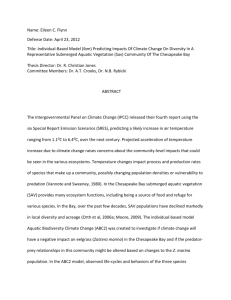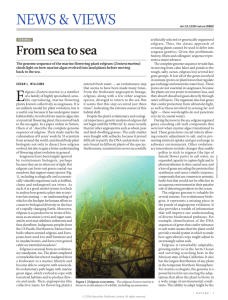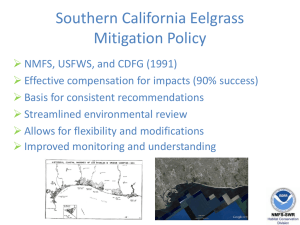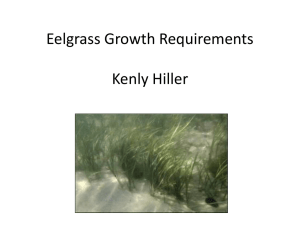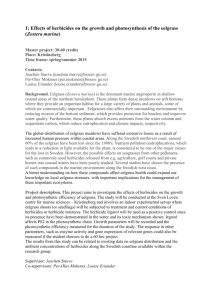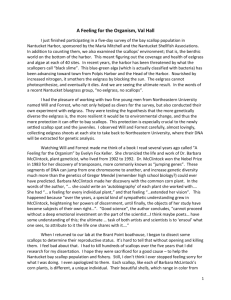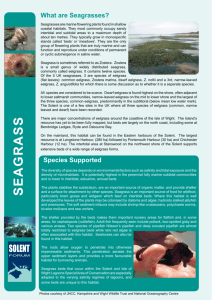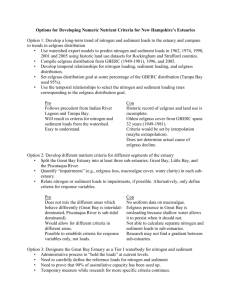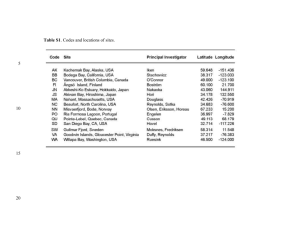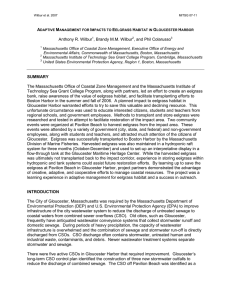Sulfide Content in Eelgrass as Related to Sediment Sulfide
advertisement
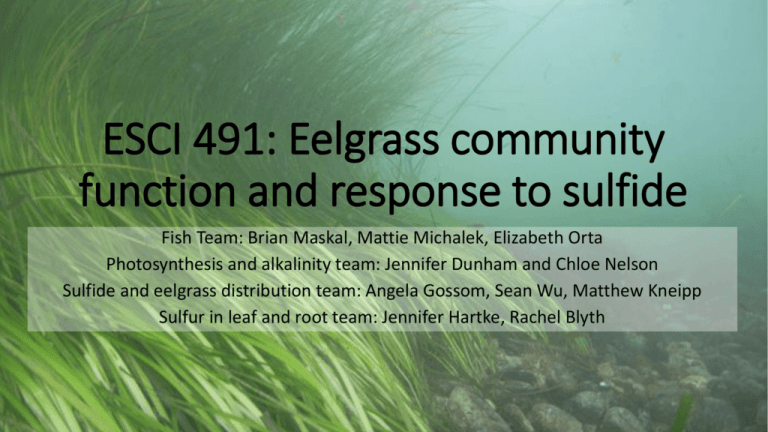
ESCI 491: Eelgrass community function and response to sulfide Fish Team: Brian Maskal, Mattie Michalek, Elizabeth Orta Photosynthesis and alkalinity team: Jennifer Dunham and Chloe Nelson Sulfide and eelgrass distribution team: Angela Gossom, Sean Wu, Matthew Kneipp Sulfur in leaf and root team: Jennifer Hartke, Rachel Blyth Eelgrass as fish habitat Questions: • Which species of fish depend upon eelgrass habitat? • Do juvenile salmon use eelgrass as habitat? Methodology: • Sample Site: Mud Bay, Bellingham, WA • Seined in eelgrass and non-eelgrass sites Fish species observed Steelhead Trout Coho Salmon Shiner Perch Spine Stickleback Tidepool Sculpins Starry Flounder Snake Prickle-back Bay Pipefish Cabazone Sculpins Crabs Pacific Staghorn Hermit Crabs Pacific Staghorn Sculpin Shrimp English Sole Fish Juvenile salmonids • • • • Eelgrass site 1: 1 Coho Eelgrass site 2: 1 Coho Non-eelgrass site 1: 1 Steelhead Non-eelgrass site 2 (in cove): 0 salmonids Salmonids found in eelgrass and non-eelgrass habitats. Coho only found in eelgrass beds On average, more species and more individual fish observed in eelgrass beds Very small sample size Eelgrass photosynthesis, oxygen, and alkalinity production Questions: • What is the rate of net photosynthesis in eelgrass? • How does the presence of eelgrass affect alkalinity production? Methods • Incubated sediment cores with and without eelgrass • Measured dissolved oxygen, DIC, and alkalinity over time Observations – Dissolved oxygen increased 30 Sediment Day Night 25 E1 20 E2 15 E3 10 E4 5 0 0.0 1.0 Incubation time (d) 2.0 Dissolved oxygen (mg/l) Dissolved oxygen (mg/l) Eelgrass Day Night 16 14 12 10 8 6 4 2 0 C1 C2 C3 C4 0.0 1.0 Incubation time (d) 2.0 Observations – DIC decreased Eelgrass 2200 Sediment 2200 Day Night 2000 E1 1800 E2 1600 E3 1400 E4 1200 1000 DIC (μM) DIC (μM) 2000 Day Night C1 1800 C2 1600 C3 1400 C4 1200 1000 0.0 0.5 1.0 1.5 Incubation time (d) 2.0 0.0 1.0 Incubation time (d) Net photosynthesis rate: 3 mg C shoot-1 d-1, or 0.1 g C m-2 d-1 2.0 Observations – Alkalinity flux 2200 Day Alkalinity (μmol kg-1) 2150 Night 2100 C1 2050 C2 2000 1950 E1 1900 E3 1850 1800 0.0 0.5 1.0 1.5 Incubation time (d) Not much change in alkalinity 2.0 Relationship between eelgrass density and pore water sulfide Questions: • How does eelgrass density vary with pore water sulfide concentration? Methods • Sampled eelgrass in two locations: Padilla Bay and Hood Canal • Measured pore water sulfide: Used sippers to sample, preserved samples in SAOB, measured sulfide using an ion-selective electrode Results – Eelgrass vs. sulfide inventory Padilla Bay Results – Eelgrass vs. sulfide inventory Hood Canal Sulfur in eelgrass leaves and roots Questions: • Does S in eelgrass reflect pore water sulfide, eelgrass density, or water-column oxygen? Methods: • Collected eelgrass leaves and roots from Padilla Bay and Hood Canal • Measured S using an elemental analyze Results: Average %S and eelgrass density Results: %S in leaves vs. pore water sulfide 0.9% 0.4 Sulfur in leaves (%) 0.35 Hood Canal 0.3 padilla Bay 0.25 0.2 0.15 0.1 0.05 0 0 0.05 0.1 0.15 0.2 Pore water sulfide at 3 cm (µM) 0.25 Not plotted – one data point from Hood Canal at 0.9 %S Results: Eelgrass density vs. %S in leaves Summary and interesting observations • Lots of fish in the Chuckanut Bay eelgrass beds but few salmonids • Rates of photosynthesis derived from DIC measurements similar to rates determined by 14C. • Eelgrass does not have a large affect on alkalinity production • Eelgrass density does not vary with pore water sulfide, nor does sulfide intrusion into leaves in Padilla Bay and Hood Canal • One shoot in Hood Canal had very high levels of S in leaves – What conditions lead to sulfide intrusion?
